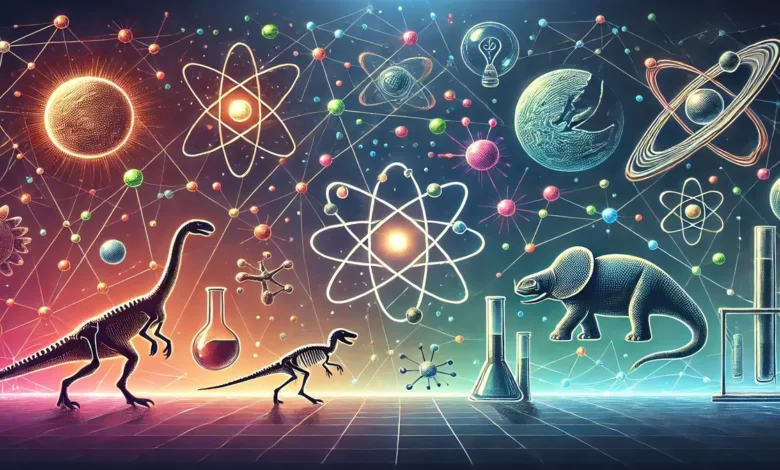Joining the Dots: Understanding Science Words Starting with J

Introduction
In the vast and varied world of science, terminology is the foundation of communication. Each scientific term carries a depth of knowledge and history that adds precision to our understanding of the world. In this article, we explore the intriguing science words that start with the letter ‘J,’ connecting diverse concepts from different branches of science.
Jargon in Science: The Role of Precise Language

Science Scientific jargon may seem daunting, but it facilitates clear and concise communication among experts. Words that begin with the letter ‘J’ are no exception. Understanding these terms is like joining the dots in a larger scientific picture, providing insights into complex ideas through simple, precise language.
- Joule (Unit of Energy)
The joule is a fundamental unit of energy in the International System of Units. Named after the English physicist James Prescott Joule, it measures the amount of energy transferred when applying one newton of force over a distance of one meter. This term is pivotal in fields like physics and engineering, where understanding energy transfer is crucial.
- Jurassic (Geological Period)
The Jurassic period, known for its association with dinosaurs, is a segment of the geological timescale from about 201 million to 145 million years ago. This era is critical for paleontologists and geologists studying the evolution of life and the Earth’s historical climate changes.
- Juxtaposition (Method in Scientific Observation)
Juxtaposition in science refers to placing two elements close together for comparative study. This technique is widely used in various scientific fields, including chemistry and art, to highlight similarities or differences, fostering a deeper understanding of the materials or phenomena under study.
- Jovian Planets (Gas Giants of Our Solar System)
The term’ Jovian planets’ refers to the gas giants of our solar system: Jupiter, Saturn, Uranus, and Neptune. These planets, characterized by their large masses and gaseous compositions, are essential for astronomers studying planetary science and the dynamics of our solar system.
- Jejunum (Part of the Small Intestine)
The jejunum is the middle section of the small intestine in humans and most higher vertebrates, including mammals, reptiles, and birds. It plays a critical role in the digestion of food and the absorption of nutrients, making it a significant term in the fields of medicine and human biology.
- Jansky (Unit of Spectral Flux Density)
Named after the American physicist Karl Jansky, the jansky is a non-SI unit used in radio astronomy to quantify the strength of astronomical radio sources. Understanding this unit is vital for astronomers and astrophysicists studying the cosmos through radio waves.
- Junction (Point of Connection in Biology and Technology)
In biology, a junction joins two things, such as cellular structures or the juncture between nerves. In technology, it typically refers to the connection between electronic components or circuits. This term is fundamental in understanding how different systems interact within organisms and engineered systems.
- Jactitation (Medical Condition)
Jactitation is a rarely used medical term describing a condition characterized by restless tossing in bed, commonly associated with severe illness or fever. It’s a term that comes up in medical contexts, highlighting the importance of patient care and symptom management in clinical settings.
- Jouissance (Psychological and Philosophical Concept)
While not exclusively a scientific term, jouissance is used in psychological and philosophical discussions to describe a state of extreme pleasure or bliss that transcends essential satisfaction. This concept is often explored in the studies of human behavior, emotions, and motivations.
Conclusion
Each of these ‘J’ terms enriches our scientific vocabulary and enhances our understanding of various phenomena across different fields of study. From the joule’s energy measurements to the Jurassic period’s historical insights and beyond, these terms connect the dots in our continuous quest for knowledge. By delving into the definitions and applications of these words, we gain a more precise and comprehensive view of the scientific landscape, illustrating just how interconnected our world is through the language of science.
FAQS
Q1: What is a joule, and why is it essential in scientific measurements?
A1: A joule is the unit of energy in the International System of Units, measuring the amount of energy transferred when applying one newton of force over a distance of one meter. It is crucial in scientific measurements for quantifying energy in various physical and engineering contexts, ensuring accuracy in energy transfer and work calculations.
Q2: How does the Jurassic period contribute to understanding Earth’s history?
A2: The Jurassic period is a significant geological timeframe known for its diversity of dinosaurs and extensive plant life. It provides critical data for paleontologists and geologists studying the evolution of life and the changes in Earth’s climate and atmospheric conditions over millions of years.
Q3: What are Jovian planets, and what can they teach us about our solar system?
A3: Jovian planets refer to the gas giants in our solar system: Jupiter, Saturn, Uranus, and Neptune. These planets are essential for studying our solar system’s atmospheric compositions, magnetic fields, and gravitational forces, offering insights into planetary formation and behavior.
Q4: What does the term ‘junction’ refer to in biology and technology?
A4: In biology, a junction refers to the connection point between two structures, such as cells or parts of an organ. In technology, it describes the connection point between electronic components or circuits. Understanding junctions is fundamental for studying how systems interact and function in biological organisms and engineered systems.
Q5: What is the significance of understanding the term ‘jactitation’ in medical contexts?
A5: Jactitation refers to restless tossing in bed associated with severe illness or fever. It is significant in medical contexts as it helps healthcare professionals identify and manage symptoms of various health conditions, contributing to more effective patient care and symptom management.





